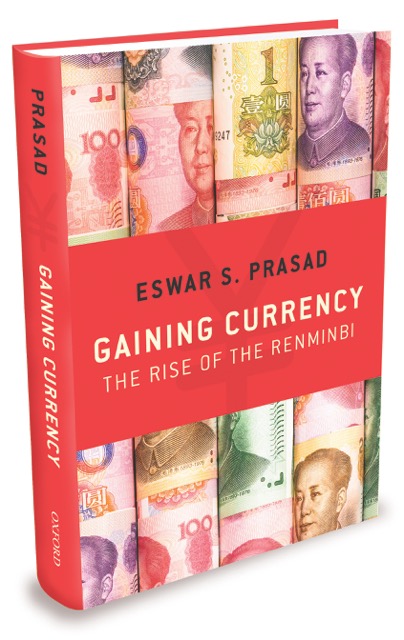
In a new book, Gaining Currency: The Rise of the Renminbi, Eswar S. Prasad, a professor at the Dyson School of Applied Economics and Management at Cornell University and former head of the International Monetary Fund’s China division, describes China’s evolving currency policy as the nation becomes an increasingly important player on the global stage. Responding to the recent dramatic drop in China’s foreign reserves and the RMB falling to its lowest levels in six years, Prasad rejects simplistic characterizations of China’s currency moves:
Is China a “currency manipulator,” as President-elect Donald Trump has suggested?
The accusation that China is manipulating its currency in order to gain an unfair advantage for its exports is not supported by economic facts. For the past two years, the Peoples’ Bank of China (PBOC, China’s central bank) has in fact been intervening in currency markets to prevent the renminbi (RMB) from falling too sharply in value against the dollar. Thus, China has, if anything, been doing the U.S. a favor by not letting the RMB depreciate as much and as fast against the dollar as the markets seem to want.
 A weakening RMB may, however, signal defensive positioning by the PBOC ahead of a rate hike by the Federal Reserve, and in the face of a strengthening dollar. It is interesting to note the irony of the U.S., in effect, contradicting its own longstanding demand for China to let market forces determine the value of the RMB. Rather, the U.S. is in the awkward position of implicitly calling for China to intervene in foreign exchange markets to prevent the RMB from depreciating significantly to the extent that markets seem to want.
A weakening RMB may, however, signal defensive positioning by the PBOC ahead of a rate hike by the Federal Reserve, and in the face of a strengthening dollar. It is interesting to note the irony of the U.S., in effect, contradicting its own longstanding demand for China to let market forces determine the value of the RMB. Rather, the U.S. is in the awkward position of implicitly calling for China to intervene in foreign exchange markets to prevent the RMB from depreciating significantly to the extent that markets seem to want.
The currency landscape could soon get more challenging. A Trump presidency portends rising economic tensions with China, particularly on trade and currency policies. It is quite conceivable that as president, Mr. Trump would feel compelled to keep a signature campaign promise and in short order formally accuse China of currency manipulation and possibly also impose tariffs against Chinese imports. This in turn would almost certainly incite an aggressive reaction from China, setting off a spiral of rapidly escalating bilateral tensions.
Under a Trump presidency, the notion of labeling China a currency manipulator and imposing high across-the-board tariffs against Chinese imports, once regarded as nuclear options, become strong possibilities. A formal charge of currency manipulation would likely elicit an immediate and aggressive counter-strike by the Chinese government. The risk is that such actions could spiral into a tit-for-tat series of restrictions on bilateral trade and investment flows that would hurt both economies.
China had taken moves to internationalize the RMB as a reserve currency, but now the government is moving to impose currency controls. What do you think is going on?
On October 1, 2016, the IMF officially declared the RMB to be an elite reserve currency by including it in the basket of currencies that constitute the IMF’s Special Drawing Rights. Since then, however, the RMB seems to have strayed off the path of becoming a major global currency.
Recent declines in the RMB’s share of global payments and RMB liquidity in offshore markets, along with the currency’s depreciation relative to the dollar, reflect the erosion of domestic and foreign investors’ confidence in the Chinese economy and its currency. In the short run, a RMB that is falling in value reduces the momentum towards its internationalization. But if this signifies a move towards a more market-determined exchange rate, that could be a plus for the RMB’s long-term role in international finance.
The free flow of capital in both directions across a country’s borders is a key element in promoting the international value of the currency. Recent moves to tighten restrictions on capital outflows do not augur well for the RMB’s status in global finance. The uncertainty spawned by on-again off-again capital controls, and the signal they send about the unpredictability of the underlying policy environment, is hardly conducive to currency internationalization.
Nevertheless, these developments could turn out to be just temporary stumbles in the RMB’s ascendance to the status of a significant international currency. If China’s economy continues to grow at a decent clip, and if the government pursues the economic liberalization and reforms it has ostensibly committed to, the currency would be back on track towards attaining greater prominence in intermediating cross-border trade and financial transactions.
China has lost almost $900 billion in foreign exchange reserves since its peak level of nearly $4 trillion in June 2014. What’s going on, and should the government be concerned?
Some of this loss is a currency valuation effect, reflecting the fall in the value of currencies such as the euro and the yen, which account for part of China’s reserve holdings, relative to the dollar.
A more important factor is the foreign exchange market intervention undertaken by the PBOC in order to keep the value of the RMB stable relative to the dollar in the face of significant capital outflows. These outflows are in part the result of the Chinese government easing restrictions on capital outflows, allowing Chinese households, corporations, and institutional investors to diversify their portfolios by increasing their foreign investments, However, the outflows also reflect concerns about China’s economy and mounting financial risks, along with capital flight exacerbated by the anti-corruption drive.
These types of outflows often tend to rise or fall together. This pattern intensified in the fall of 2015, when the PBOC moved to free up the exchange rate and allow its value to be more freely determined by market forces. This move, which was accompanied by a 2 percent devaluation of the RMB relative to the dollar, was misinterpreted by financial markets as a sign of panic of a government desperate to counteract a falling stock market and stalling growth. This created a capital outflow-currency depreciation spiral that has proven difficult to manage and has complicated domestic policymaking.
While short-term growth has stabilized, a redoubled commitment to financial market and broader economic reforms is going to be essential to start rebuilding domestic and foreign investor confidence that in turn will be crucial for stabilizing capital flows.


